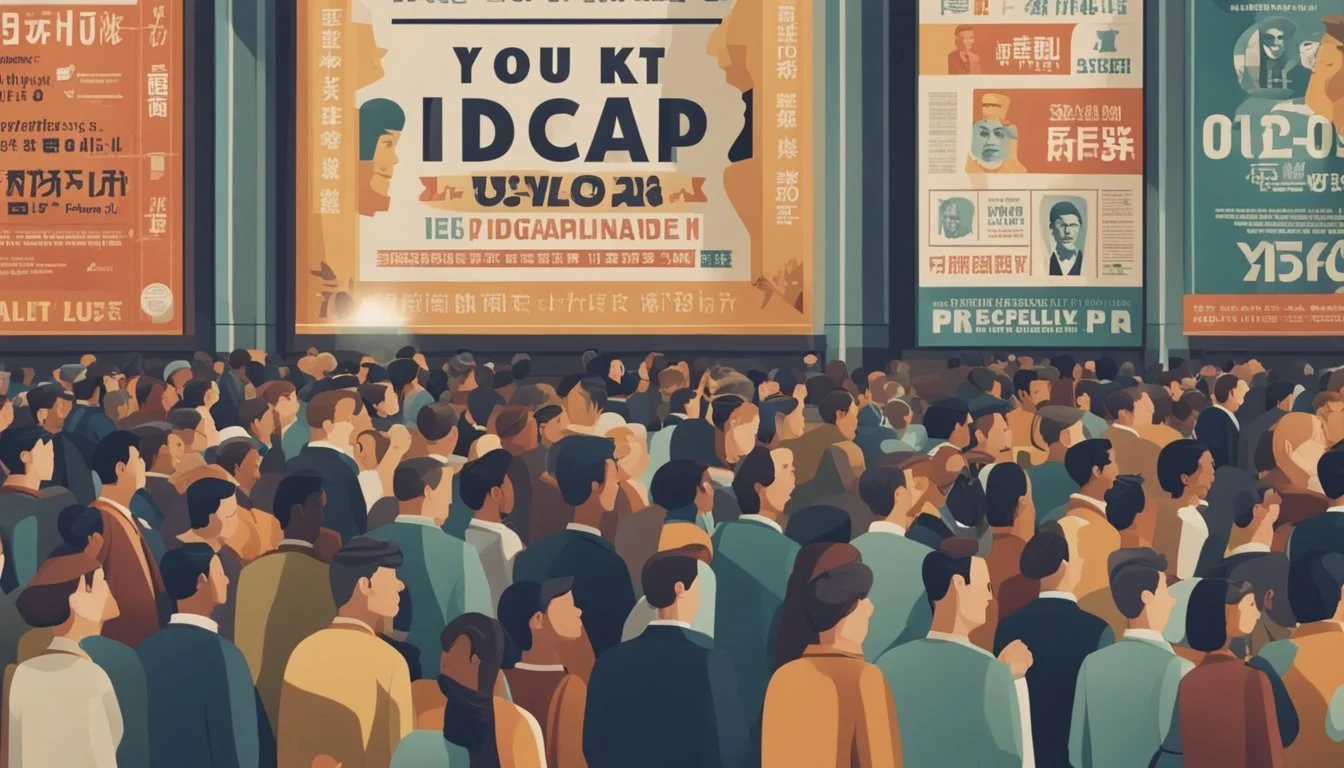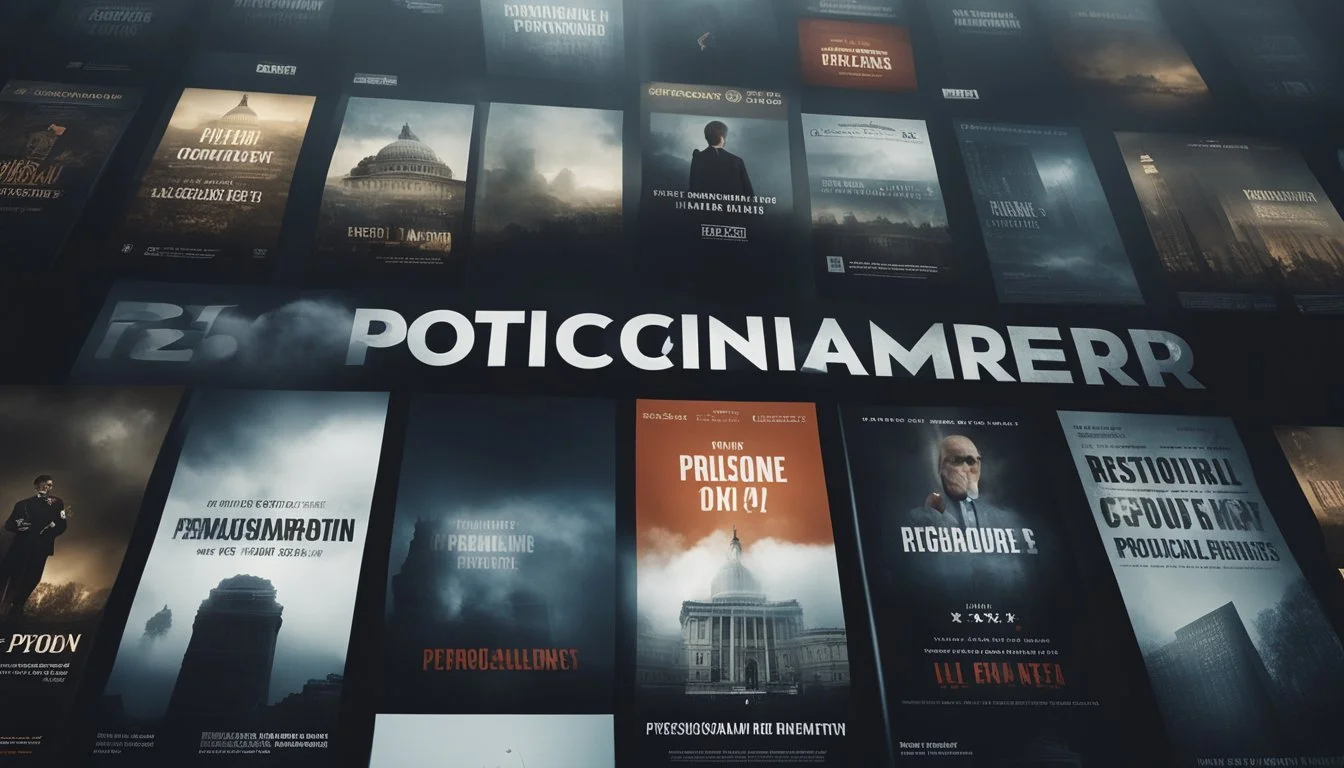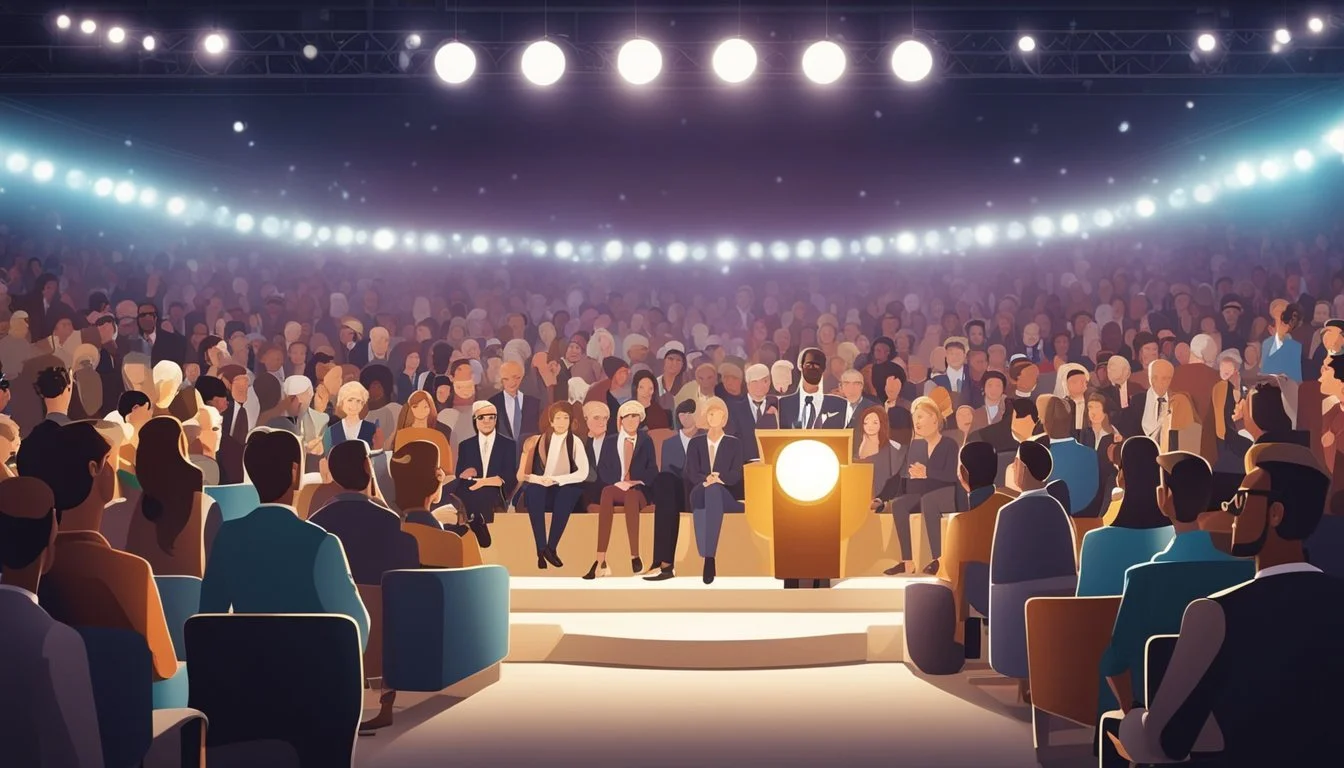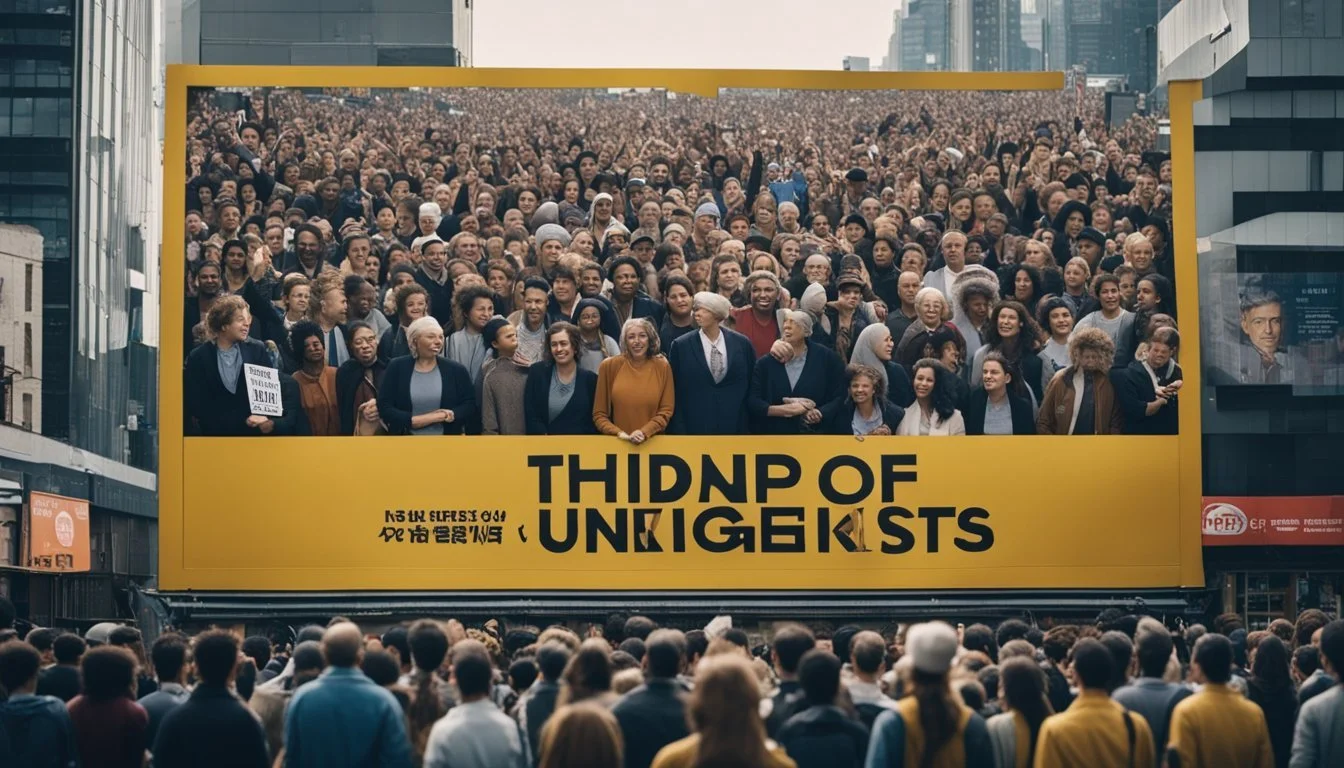11 Documentaries About Political Propaganda That You Need to Watch
Documentaries offer a compelling lens through which to examine the intricate world of political propaganda. By showcasing both historical and contemporary examples, these films help unravel the strategies and impacts of propaganda on societies.
What drives the creation and dissemination of political propaganda? The selected documentaries delve into various narratives, providing insights into how governments and organizations influence public opinion through media and messaging.
1) The Putin Interviews (2017)
"The Putin Interviews" is a four-part documentary directed by Oliver Stone, released in 2017. Stone was granted unprecedented access to Russian President Vladimir Putin over two years.
Through a series of candid conversations, the film explores Putin's perspectives on various political issues, including U.S.-Russia relations and internal Russian politics. Each part provides a rare glimpse into the thoughts and strategies of one of the world's most influential leaders.
The documentary is notable for its breadth and the directness of the questions posed, offering viewers a deeper understanding of Putin's worldview. It remains a significant resource for anyone interested in contemporary geopolitics and Russian domestic affairs.
For more information, visit IMDb.
2) The Great Hack (2019)
"The Great Hack" offers a deep dive into the Cambridge Analytica scandal. This documentary is directed by Karim Amer and Jehane Noujaim. It explores how Facebook data was harvested and utilized to influence political events such as the 2016 U.S. presidential election and the Brexit referendum.
The film effectively highlights the misuse of personal data by Cambridge Analytica. Through interviews and investigative work, it reveals the extent to which data mining and targeted political advertising swayed public opinion and electoral outcomes.
Insightful and unsettling, "The Great Hack" underscores the ethical concerns of data privacy in the digital age. The documentary serves as a wake-up call about the potential dangers of unchecked data usage by corporations and political entities.
For more information, visit The Great Hack on IMDb
3) Reel Bad Arabs (2006)
"Reel Bad Arabs: How Hollywood Vilifies a People" is a documentary directed by Sut Jhally and produced by the Media Education Foundation. The film is based on the book by Jack Shaheen, examining Hollywood’s portrayal of Arabs and Muslims across a century of cinematic history.
Jack Shaheen, the acclaimed author, highlights how Arab characters are often depicted negatively in films. These portrayals range from Bedouin bandits to heartless villains, reinforcing harmful stereotypes. The documentary meticulously analyzes 1,000 films, showcasing these biased depictions.
This film delves into the societal impact of such portrayals. By continuously presenting Arabs and Muslims in a negative light, Hollywood contributes to prejudiced views and misunderstandings among audiences. Shaheen's analysis brings to light the need for a more nuanced and accurate representation of diverse cultures in media.
"Reel Bad Arabs" stands out for its thorough dissection of cinematic history and its call for change in Hollywood practices. Featuring interviews, film clips, and expert commentary, it offers a compelling critique of the film industry’s disturbing trends.
For more information, visit the Wikipedia page or the IMDb page.
4) The Cleaners (2018)
The Cleaners is a documentary that sheds light on the hidden world of content moderators. Directed by Hans Block and Moritz Riesewieck, the film uncovers the lives of individuals based in Manila who are responsible for filtering out graphic and disturbing content from social media platforms.
The film portrays the psychological and moral toll that this work takes on the moderators. These individuals spend their days sifting through content like terrorist videos, political propaganda, and other harmful materials.
Exploring the broader implications, the documentary reveals how social media can be manipulated both as a tool for free expression and as a platform for extremist views. The ethical queries it raises about censorship and freedom of speech are particularly compelling.
For more information, visit IMDb.
5) Century of the Self (2002)
"Century of the Self" is a British television documentary series created by filmmaker Adam Curtis. Released in 2002, this four-part series delves into the work of psychoanalysts Sigmund Freud and Anna Freud. It examines how their ideas, as interpreted and applied by PR consultant Edward Bernays, have been used by those in power to manipulate and control public opinion.
The series explores the changing perceptions of human nature and the development of psychology throughout the 20th century. It particularly emphasizes how these psychological theories have been harnessed by institutions for social control. Curtis uses a mix of archival footage and interviews to build his narrative.
A significant portion of the series spotlights the influence of Freud's family, especially his daughter Anna Freud. By connecting their psychoanalytic theories to modern practices in public relations and advertising, the documentary sheds light on the psychological manipulation techniques that shape mass democracy.
"Century of the Self" contrasts whimsical film footage with an ominous narrative, adding depth to its exploration of propaganda. It remains a critical resource for those interested in understanding the intersection of psychology and political propaganda.
For more information, visit Wikipedia or IMDb.
6) Manufacturing Consent (1992)
"Manufacturing Consent: Noam Chomsky and the Media" is a 1992 documentary that examines the political views and contributions of Noam Chomsky, a prominent linguist and political activist. The film was directed by Canadian filmmakers Mark Achbar and Peter Wintonick.
This documentary delves into Chomsky's critique of mass media and its role in shaping political and public opinion. Through a mix of biographical segments, archival footage, and various graphical illustrations, the film explores how media corporations control and influence information.
Chomsky, alongside Edward S. Herman, authored the book "Manufacturing Consent" in 1988. The documentary extends this analysis, focusing on the influence of corporate interests in media practices and the dissemination of propaganda.
The film also features interviews and debates with various intellectuals, providing a comprehensive look at Chomsky's arguments about media complicity in political and social agendas.
"Manufacturing Consent" has won numerous awards and remains an influential resource for those interested in media analysis and political theory.
7) HyperNormalisation (2016)
Adam Curtis's "HyperNormalisation" (2016) is a BBC documentary that explores how governments, corporations, and technological idealists created a simplified version of reality since the 1970s.
The film posits that these actors abandoned attempts to understand the complex real world, instead crafting a "fake world" to maintain stability and corporate interests.
Curtis uses a rich array of repurposed footage to emphasize his narrative, avoiding the traditional talking-heads interview format.
He examines key figures and moments in history, explaining how political and societal changes have led to the confusing and seemingly inexplicable world events we see today.
Noteworthy figures such as Donald Trump and Vladimir Putin are highlighted to illustrate the global reach of this oversimplification.
For further details on "HyperNormalisation," visit HyperNormalisation on IMDb.
8) The Shock Doctrine (2009)
"The Shock Doctrine" is a documentary by Naomi Klein that explores how major political and economic changes often occur in the aftermath of crises. Directed by Mat Whitecross and Michael Winterbottom, the film is a companion piece to Klein's book of the same name.
The documentary discusses how natural disasters and man-made crises are used to implement controversial "free market" policies. These policies often include privatization, deregulation, and cuts to social services. The film argues that such reforms are pushed through while populations are in a state of shock and unable to effectively resist.
Klein examines various global events, suggesting that they were exploited for economic gain. The film looks at instances like the Iraq War, Hurricane Katrina, and the 2008 financial crisis to illustrate its thesis. Interviews and archival footage provide a comprehensive look into how these strategies have been employed.
For more information, visit IMDB.
9) The Act of Killing (2012)
"The Act of Killing" is a groundbreaking documentary directed by Joshua Oppenheimer, with Christine Cynn and an anonymous Indonesian co-directing.
The film explores the 1965-66 Indonesian mass killings from the perspective of the perpetrators. These individuals participated in the torture and killing of alleged communists and those opposed to the New Order regime.
In a unique format, the documentary features the perpetrators reenacting their crimes. This approach reveals their lack of remorse and the ongoing trauma that haunts them.
Anwar Congo, one of the key figures in the film, exhibits these conflicting emotions, transitioning from pride to distress over his past actions. His story underscores the lasting impact of the atrocities committed.
For more detailed information, visit The Act of Killing on Wikipedia.
10) The Fog of War (2003)
"The Fog of War: Eleven Lessons from the Life of Robert S. McNamara" explores the complex nature of modern warfare through the eyes of Robert S. McNamara, a former U.S. Secretary of Defense. Directed by Errol Morris, the film delves into McNamara's role in critical historical events like the Cold War, the Vietnam War, and the Cuban Missile Crisis.
McNamara provides insightful lessons from his experiences in leadership and decision-making, enhancing the film’s examination of political and military propaganda. Featuring an original score by Philip Glass, the documentary's impact is heightened by compelling music that underscores its serious themes.
The film's title derives from the military concept of the "fog of war," which refers to the uncertainty faced by participants in military operations. This concept ties into the film’s broader questions about morality, strategy, and human error in the context of warfare.
For more detailed information about "The Fog of War: Eleven Lessons from the Life of Robert S. McNamara," you can visit its Wikipedia page.
11) Citizenfour (2014)
Citizenfour, directed by Laura Poitras, exposes the NSA's extensive surveillance operations through the eyes of whistleblower Edward Snowden.
The documentary captures the crucial moment when Snowden first contacts Poitras and journalists Glenn Greenwald and Ewen MacAskill. It documents their tense meetings in Hong Kong, where Snowden reveals classified information detailing the government's covert data collection programs.
Citizenfour provides an intimate look into Snowden's personal sacrifice and the ethical dilemmas surrounding mass surveillance. The film's real-time unfolding of events offers a gripping narrative that highlights the risks faced by whistleblowers.
With its behind-the-scenes access, Citizenfour has been lauded for its critical examination of privacy and government accountability. The documentary encourages viewers to reflect on the balance between national security and individual freedoms.
For more information, visit Citizenfour on IMDb.
Understanding Political Propaganda
Political propaganda is a tool used by governments, organizations, or individuals to shape perceptions, manipulate beliefs, and influence actions. Through various types, it has been deployed throughout history to achieve specific political objectives.
Definition and Meaning
Political propaganda refers to the dissemination of information, ideas, or rumors deliberately spread to influence opinions or actions in favor of a particular cause. It is designed to evoke emotional responses and reinforce specific viewpoints. Propaganda often involves biased, misleading, or false information intended to sway public opinion and control political narratives.
Key attributes of political propaganda:
Targets large audiences
Utilizes various media channels
Focuses on emotional appeal
Often includes misrepresentation of facts
Historical Context
Throughout history, political propaganda has played a significant role in shaping public opinion. In ancient Rome, emperors used sculptures and paintings to project power and divine favor. The Nazi regime in Germany infamously utilized propaganda to demonize enemies and foster nationalistic fervor, as seen in the film "Triumph of the Will."
In World War II, both the Allies and Axis powers used propaganda to bolster support and morale. The United States Army's production of "The Negro Soldier" exemplifies how propaganda was employed to encourage African Americans to enlist and support the war effort.
Eras of notable propaganda use:
Ancient Rome
Nazi Germany
World War II
Cold War
Types of Propaganda
Propaganda can be classified into several types based on tactics and objectives:
White Propaganda: Openly sourced and typically truthful but designed to promote a specific agenda.
Black Propaganda: Concealed source and false information meant to deceive.
Grey Propaganda: Source unclear and possibly mixed truth and falsehoods.
Other types include disinformation (deliberate false information) and agitation propaganda (stirs people to action). For instance, "Propaganda" (2012), which claims involvement of North Korean defectors, blurs the lines between truth and manipulation to evoke strong emotional responses.
By scrutinizing these types, one can better recognize and critically analyze propaganda in media and politics.
Impact of Political Propaganda
Political propaganda can shape mindsets, influence public perception, and change societal narratives through calculated messaging and media. It affects individual psychology, sways collective opinions, and has numerous instances worldwide that exemplify its profound impact.
Psychological Effects
Political propaganda triggers emotional responses aimed at shaping attitudes and beliefs. It often uses fear, pride, or hatred to alter perceptions and motivate actions. Techniques like repetition and bandwagon effects reinforce messages, making them more believable.
Propaganda can create cognitive biases, leading individuals to process information in a way that fits pre-existing beliefs. This psychological manipulation can affect decision-making, turning neutral individuals into staunch supporters or opponents.
Influence on Public Opinion
Propaganda is a powerful tool for molding public opinion. By controlling media narratives, political entities sway the views of the masses. This was evident with the US Army’s release of The Negro Soldier in 1944, designed to convince African Americans to support the war effort.
Media saturation ensures the omnipresence of certain ideas, which solidifies them in the public consciousness. Political campaigns, often accompanied by propagandist rhetoric, can alter voting behaviors and policy support. The constant dissemination of favorable or unfavorable information about political figures or policies heavily influences public attitudes.
Case Studies
Historical cases provide a clear view of propaganda's impact. Triumph of the Will, a 1935 Nazi propaganda film, glorified Adolf Hitler and the Nazi Party, rallying massive public support. Its sophisticated use of imagery and speeches showcased the power of propaganda in shaping national sentiment.
In contrast, the cinematic portrayal of Mr. Yunioshi in Breakfast at Tiffany's exemplifies how propaganda can perpetuate racial stereotypes and biases. Mickey Rooney’s portrayal reinforced negative caricatures of Japanese people, demonstrating that propaganda's reach extends into cultural and social dimensions.
Modern instances, such as the web series on Narendra Modi, illustrate how contemporary political figures utilize media to craft and control their public image. The series, shot in real locations, presents Modi's journey, influencing public perception by highlighting his achievements and downplaying controversies.






